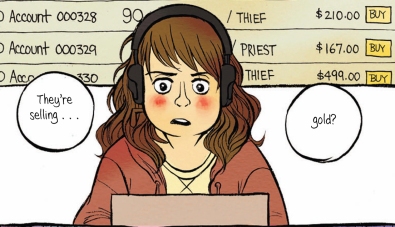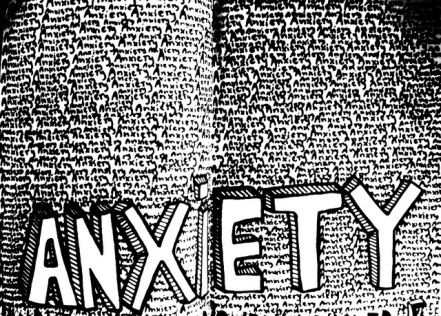If you haven’t gathered yet, I love graphic novels. I’ve chewed through a lot of them in my time here at CSC, and while they almost never lack depth or material, they’re usually pretty easy / quick reads. I’ll usually give one a quick pass-over for the sake of the plot, then re-read it slower to better admire the artwork. Either way, it never takes more than an hour.
Except.
Nate Powell’s “Swallow Me Whole” stopped me dead in my tracks. I actually had to re-start it just to make sure I hadn’t fallen off and misunderstood something somewhere. This one is thick, not length wise, but material wise. It’s one of a select few graphic novels I’ve actually had to chew on, and one with an ending that is only remotely clear.
Going Mental
“Swallow Me Whole” deals with the tale of two step-siblings with a dying grandmother and parents that are quick to write off their childrens’ mental instability. Ruth, diagnosed with OCD as well as a form of schizophrenia, hears insects and other animals speak out to her, beg her to be their liaison, their ambassador to the higher world. Perry, also schizophrenic, sees a wizard appear atop all of his pencils, sending him on “missions” that produce fantastic drawings. Both siblings have a grandmother who is expected to kick the bucket relatively soon (who actually stays with them for several years) who also shares some form of mental illness – she is constantly traveling back in her mind to her youth, when her husband was alive and she was an avid painter.
The tale is a hard one to swallow, pun fully intended. Ruth, after outbursts at school, is eventually diagnosed and medicated for her disorders. Perry never does. Perry’s illness, since it results in a creative outlet, isn’t considered illness. Ruth’s non-conventional (for the stereotype of her sex) interest in insects and biology further her along toward medication. The book throws everything on the table: gender stereotypes, mental illness (and its societal stigmas), adolescence, dysfunctional family, the works. It isn’t for the feint of heart by any means. Nor is it an “easy read.” The ending is both tragic and ambiguous. It’s never spelled out for the reader, ala Inception, we are only left with pieces that we have to put together ourselves. A great deal of why this book is so difficult to digest lies in the artwork. So that’s where we’re headed.
A Lot to Swallow
Powell’s artwork in this piece is hard to wrap your head around. The entire novel takes on a disconnected, dream-like quality with strictly black and white artwork. Powell doesn’t rely strictly on white as a backdrop either, obviously – there are gobs of black ink in this book. Speech bubbles are distorted and hard to read, stream-of-consciousness thoughts are splattered on the page, and we are treated constantly to perspective shifts as they happen: one moment, Ruth is looking at a vent grate on her ceiling. The next moment, insects are pouring out of it. The unpredictable, dissociative nature of the illnesses Ruth and Perry suffer from are reflected heavily in the artwork. I can’t speak for anyone else, but at times, it became extremely difficult to follow.
Though the tale is about both Ruth and Perry (and memaw a bit, as well) it definitely follows Ruth more often. She goes through stages of silent coping with her disorder, to ignoring it, to even accepting and “embracing” it (which leads to some poor choices and behavioral outbursts), and eventually, being consumed, swallowed whole, by it. The artwork becomes more chaotic as Ruth’s mindset changes. The book culminates in a swarm of insects, and from there – well. You’ll have to read it for yourself.
This one has my brain revving at full speed. There’s a lot to digest, a lot of pieces that need put together (but are all there), and a lot to be said. Did I enjoy it? Yes, I did. There’s definitely a story to be told here, and there are a lot of things to be said. If anything, it made me think. Still has me thinking. I count that as literature any day.
Insania


















